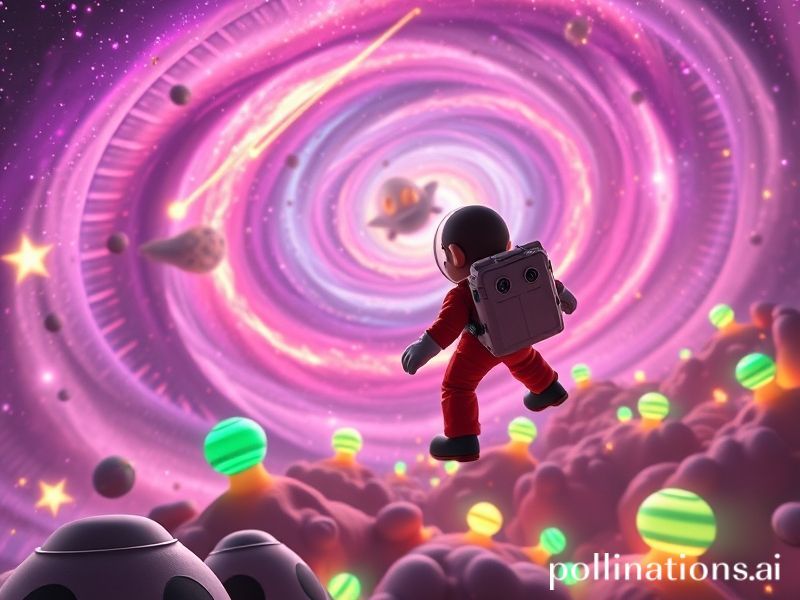Mario in Orbit: How a Plumber’s Space Odyssey Became Planet Earth’s Last Shared Delusion
Mushroom Kingdom Goes Multilateral: How a Plumber in Space Became the UN’s Accidental Mascot
By our man in low-Earth orbit, still waiting for the Wi-Fi to catch up
GENEVA—The lights dimmed, the orchestra struck up a Koji Kondo medley, and for 124 minutes last week the 78th International Film Festival surrendered its customary velvet melancholy to an Italian-American tradesman in zero-gravity overalls. “Super Mario Bros. Galaxy: The Motion Picture” premiered to a standing ovation that included three deputy-secretaries-general, one ex-dictator on a shopping trip, and a Saudi fund manager who immediately green-lit a theme park orbiting Riyadh. Critics hailed it as “the cinematic equivalent of putting cryptocurrency on a pizza,” which, depending on your portfolio, is either visionary or a cautionary tale about melted plastic.
From a purely terrestrial standpoint, the film is nonsense: a Brooklyn plumber is launched into space via a tanooki suit and proceeds to monetize star fragments while evading a giant spiked turtle with territorial grievances. Yet the global audience—US$1.2 billion in 72 hours, surpassing the GDP of Fiji—appears to have decided this is the origin story the 21st century deserves. In Manila, commuters exiting a four-hour traffic jam queued for midnight screenings the way their grandparents once queued for rice. In Berlin, eco-activists projected Mario’s face onto the remnants of the Wall with the tagline “LEVEL UP, COMRADES.” Even Moscow’s culture ministry, fresh from banning everything with rainbows, granted the film an 8+ certificate, presumably because Bowser’s invasion playbook looks quaint compared to current field manuals.
Why does a jumping CGI contractor resonate from Lagos to Lagos (the one in Portugal, not Nigeria)? Anthropologists at the Sorbonne suggest that Mario—perpetually dispatched on impossible side quests by an absentee princess—mirrors the modern citizen: overworked, underpowered, and reliant on magical fungi to survive the news cycle. Meanwhile, macro-economists note that the film’s central currency, star bits, behaves more responsibly than the British pound, prompting Ghanaian policymakers to joke—quietly—about pegging the cedi to a Nintendo IP.
The United Nations, never one to miss a bandwagon painted primary colors, has seized the moment. Next month’s COP summit in Dubai will feature a holographic Mario guiding delegates through a warp-pipe visualization of rising sea levels. (“If you can’t dodge a cheep-cheep, you can’t dodge accountability,” the script reportedly deadpans.) Delegates from sinking Pacific islands accepted the stunt with the weary grace of people who have already tried singing to coral reefs. Still, the merch sells: limited-edition “1-UP for the Planet” carbon credits, yours for only 1200 coins—plus shipping, because the blockchain never learned how to jump.
Back in the private sector, corporate boardrooms are conducting post-mortems on why their quarterly earnings can’t generate the same reflexive joy as a fire-flower. Consultants in Milan now bill US$4,000 an hour to reframe supply chains as “bonus stages.” In Seoul, an AI start-up claims its algorithm can predict stock fluctuations by measuring the exact pitch of Mario’s “Let’s-a-go!”—a service marketed exclusively to hedge funds too young to remember 2008. They subscribe anyway; nostalgia is the last safe asset class, slightly less volatile than water rights.
Yet beneath the neon, darker notes thrum. Syrian children in refugee camps recreate Galaxy levels with chalk and rubble, staging star-hunts that end when the real sky drones in. Somewhere over the Pacific, SpaceX interns have already calculated the propulsion needed to hurl an actual turtle shell into low orbit—strictly for marketing, they insist, though the Pentagon returned their call in under five minutes. Even the Vatican’s official Jesuit journal published a think piece titled “The Existential Loneliness of Rosalina,” prompting bookmakers to slash odds on a papal Twitch channel before Christmas.
So, yes, the film is brightly colored nonsense. But in a period when terrestrial leadership alternates between hostage video and sleep paralysis, perhaps nonsense is the only lingua franca left. We laugh, we purchase, we meme, because the alternative is to acknowledge that the level we’re really stuck in has no flag, no extra life, and a timer counting down in languages none of us bothered to learn. The credits roll, the star-credit song plays, and the planet shuffles out into the neon night, slightly pixel-drunk, secretly hoping for a hidden warp zone that actually works.
In the end, Mario doesn’t save the universe; he simply reminds it that the jump button still exists. We press it, reflexively, knowing full well the abyss is between platforms. Still, for 0.7 seconds—hang time measured in every currency—we are, all of us, airborne.







